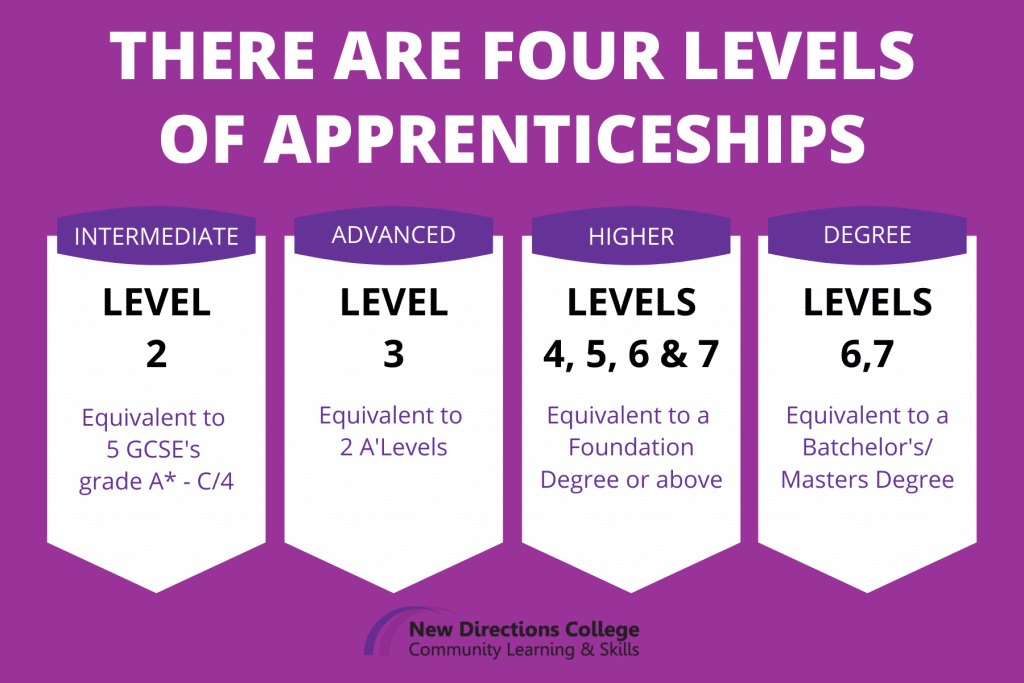Apprenticeships
If you like the idea of gaining a qualification while you work, or would like to upskill in your current role, why not consider an apprenticeship?
Apprenticeships are open to anyone above the age of 16 and you can gain qualifications from Level 2 up to Level 6/7. There is no maximum age to be an apprentice which is a common misconception.
An Apprenticeship will allow you to earn while you learn in a real job and gain nationally recognised qualifications alongside valuable workplace skills.
We recommend the information, advice and guidance available at the following websites:
At New Directions College, we have been recognised by awarding body City and Guilds and the Institute of Leadership and Management for the excellence in delivery of apprenticeships and end point assessment. This is our Leadership and Management Tutor John Holland being presented with the award in November 2022.
Apprenticeships can take between 1 and 4 years to complete depending on the level of the Apprenticeship, your current skills and the industry sector.
Entry requirements depend on the level of Apprenticeship, the industry sector and the employer’s requirements. For those who have not achieved English or Maths GCSE grade A*-C, your Apprenticeship will include Functional Skills qualifications to be completed alongside your Apprenticeship programme.
Apprenticeships start on an individual basis all year round and sometimes employers also recruit apprentices in cohorts. Employers will advertise their Apprenticeship vacancies directly. Apprenticeship training providers also advertise the vacancy on the employers behalf.
Depending on your employer, the typical working hours will be full time, 35-37 hours a week. You will get dedicated time to focus on your Apprenticeship work as well as time to attend training with New Directions College. This training will be a mix of face to face delivery, online workshops and work based assessment.
This will be determined by the employer. You will receive at least the Apprenticeship minimum wage.
The current (01.04.2021) minimum wage rate for an apprentice is £4.30 per hour. This rate changes on the first of April each year. Check here for updates.
Apprentices
Apprentices are entitled to the apprentice rate if they’re either:
- aged under 19
- aged 19 or over and in the first year of their apprenticeship
ExampleAn apprentice aged 21 in the first year of their apprenticeship is entitled to a minimum hourly rate of £4.30.
Apprentices are entitled to the minimum wage for their age if they both:
- are aged 19 or over
- have completed the first year of their apprenticeship
ExampleAn apprentice aged 21 who has completed the first year of their apprenticeship is entitled to a minimum hourly rate of £8.36.
Apprenticeship Levels

Apprenticeship delivery currently available at New Directions College
- L3 Operational Delivery Officer
- L3 Business Administration
- L3 Team Leader/Supervisor
- L5 Operational/Departmental Manager
- L3 Customer Service
- L2 Early Years Practitioner
- L3 Early Years Educator
Employers
If you are considering employing an Apprentice, please speak to us to find out how we can support you. We can guide you through the various employer incentives that are available and help you to recruit the ideal candidate for your role. Furthermore, we can tailor the apprenticeship training so that it meets the requirements of the apprenticeship standard and the needs of your business.
The most important advice, is to make sure the apprentice will have a person to be their guide or mentor. All apprentices will need on the job training and over 70% of the knowledge and skills an apprentice will gain, will come from this.
The remaining 30% comes from off the job training. This will take the form of time away from the job to study technical skills, develop underpinning knowledge and to start demonstrating their skills and behaviours through work based assessment.
Employing an apprentice is extremely rewarding and helps to develop your business through the development of new and existing talent.
Once you have identified a person or persons who will coach and mentor the apprentice, we can provide accredited training in management or coaching. This is not mandatory, however, it would prove to be excellent continuous professional development for the mentor/coach and accredit their management skills formally.
Advice and Guidance
Here are some frequent hints and tips we provide to employers who are considering hiring an apprentice:
How can you support your apprentice with their Apprenticeship programme?
Take time to set expectations and give advice from the very beginning to help them settle. Plan for the apprentice to be away from the work environment whilst they are participating in off the job training. This is part of their paid working hours and should be a minimum of 30% of their time.
Identify a coach or mentor for the apprentice as well as a line manager. This person or team should provide the apprentice with their on the job training and give them regular feedback on their performance.
Where possible, develop an induction programme
We recommend you run an induction in the first 3-4 weeks of the Apprenticeship programme. The induction should cover expectations from you and the business, as well as outlining their role within the workplace. This applies for existing staff who have become apprentices as well, so they understand the expectations whilst on programme and how it will affect their role. If your apprentice is a new external hire, this will help your apprentice and develop their understanding of your company’s products and services and the expectation of their role and responsibility.
Hold regular meetings with your apprentice and always contribute to reviews
At the beginning of the programme, the meetings should be more frequent to guide them and provide support. Meetings will give them the opportunity to ask questions and for you to provide advice and guidance. For existing staff, it will allow you time to discuss how they are balancing their workload and studies.
Employers are an integral part to the formal review process between the employer, apprentice and training provider. All three should meet frequently to review progress.
Matching your apprentice’s work to their development plan
This will vary depending on your organisation. However, it is important that your apprentice gets good exposure to relevant experiences on real work projects to assist with their growth and development, which will assist them to achieve the learning outcomes of their programme.
Real work projects and experiences are important for the overall success of the Apprenticeship programme.
How much do you need to pay the apprentice?
Apprentice pay and the National Minimum Wage
The Government has set out national minimum wage for apprentices, this is currently £4.81 per hour (going up to £5.28 per hour from 1.4.23) although you can pay them more.
There are different rates of pay for apprentices depending on their age and what year of Apprenticeship they are in.
You can find the current national living wage and national minimum wage rates by visiting the government website.
If you are looking to gain a local apprenticeship or you are an employer hoping to offer an apprenticeship, you can contact us using this form and we will get back to you as soon as possible.
Alternatively you can contact our Apprenticeships Manager, Besmir Baxha
besmir.baxha@reading.gov.uk
07929 787 697


